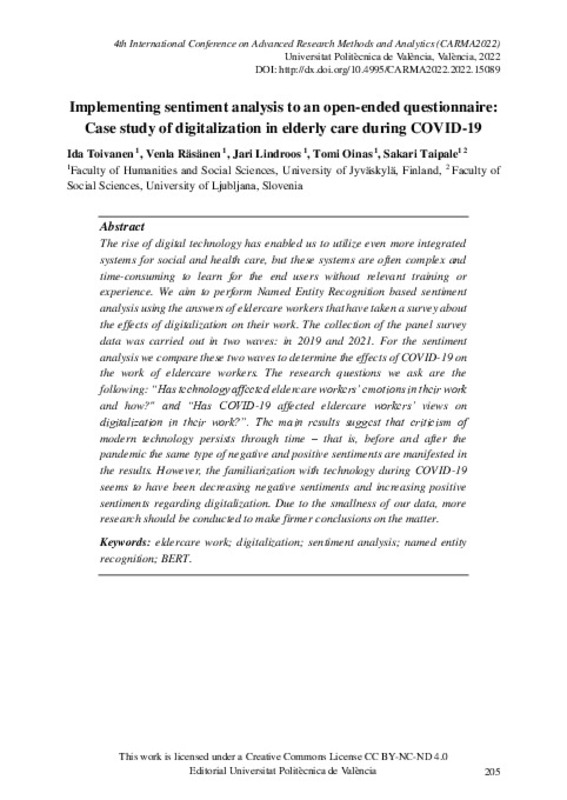JavaScript is disabled for your browser. Some features of this site may not work without it.
Buscar en RiuNet
Listar
Mi cuenta
Estadísticas
Ayuda RiuNet
Admin. UPV
Implementing sentiment analysis to an open-ended questionnaire: Case study of digitalization in elderly care during COVID-19
Mostrar el registro sencillo del ítem
Ficheros en el ítem
| dc.contributor.author | Toivanen, Ida
|
es_ES |
| dc.contributor.author | Räsänen, Venla
|
es_ES |
| dc.contributor.author | Lindroos, Jari
|
es_ES |
| dc.contributor.author | Oinas, Tomi
|
es_ES |
| dc.contributor.author | Taipale, Sakari
|
es_ES |
| dc.date.accessioned | 2022-11-10T13:14:36Z | |
| dc.date.available | 2022-11-10T13:14:36Z | |
| dc.date.issued | 2022-09-20 | |
| dc.identifier.isbn | 9788413960180 | |
| dc.identifier.uri | http://hdl.handle.net/10251/189575 | |
| dc.description.abstract | [EN] The rise of digital technology has enabled us to utilize even more integrated systems for social and health care, but these systems are often complex and time-consuming to learn for the end users without relevant training or experience. We aim to perform Named Entity Recognition based sentiment analysis using the answers of eldercare workers that have taken a survey about the effects of digitalization on their work. The collection of the panel survey data was carried out in two waves: in 2019 and 2021. For the sentiment analysis we compare these two waves to determine the effects of COVID-19 on the work of eldercare workers. The research questions we ask are the following: “Has technology affected eldercare workers’ emotions in their work and how?" and “Has COVID-19 affected eldercare workers’ views on digitalization in their work?”. The main results suggest that criticism of modern technology persists through time – that is, before and after the pandemic the same type of negative and positive sentiments are manifested in the results. However, the familiarization with technology during COVID-19 seems to have been decreasing negative sentiments and increasing positive sentiments regarding digitalization. Due to the smallness of our data, more research should be conducted to make firmer conclusions on the matter. | es_ES |
| dc.format.extent | 8 | es_ES |
| dc.language | Inglés | es_ES |
| dc.publisher | Editorial Universitat Politècnica de València | es_ES |
| dc.relation.ispartof | 4th International Conference on Advanced Research Methods and Analytics (CARMA 2022) | |
| dc.rights | Reconocimiento - No comercial - Sin obra derivada (by-nc-nd) | es_ES |
| dc.subject | Eldercare work | es_ES |
| dc.subject | Digitalization | es_ES |
| dc.subject | Sentiment analysis | es_ES |
| dc.subject | Named entity recognition | es_ES |
| dc.subject | BERT | es_ES |
| dc.title | Implementing sentiment analysis to an open-ended questionnaire: Case study of digitalization in elderly care during COVID-19 | es_ES |
| dc.type | Capítulo de libro | es_ES |
| dc.type | Comunicación en congreso | es_ES |
| dc.identifier.doi | 10.4995/CARMA2022.2022.15089 | |
| dc.rights.accessRights | Abierto | es_ES |
| dc.description.bibliographicCitation | Toivanen, I.; Räsänen, V.; Lindroos, J.; Oinas, T.; Taipale, S. (2022). Implementing sentiment analysis to an open-ended questionnaire: Case study of digitalization in elderly care during COVID-19. En 4th International Conference on Advanced Research Methods and Analytics (CARMA 2022). Editorial Universitat Politècnica de València. 205-212. https://doi.org/10.4995/CARMA2022.2022.15089 | es_ES |
| dc.description.accrualMethod | OCS | es_ES |
| dc.relation.conferencename | CARMA 2022 - 4th International Conference on Advanced Research Methods and Analytics | es_ES |
| dc.relation.conferencedate | Junio 29-Julio 01, 2022 | es_ES |
| dc.relation.conferenceplace | Valencia, España | |
| dc.relation.publisherversion | http://ocs.editorial.upv.es/index.php/CARMA/CARMA2022/paper/view/15089 | es_ES |
| dc.description.upvformatpinicio | 205 | es_ES |
| dc.description.upvformatpfin | 212 | es_ES |
| dc.type.version | info:eu-repo/semantics/publishedVersion | es_ES |
| dc.relation.pasarela | OCS\15089 | es_ES |








